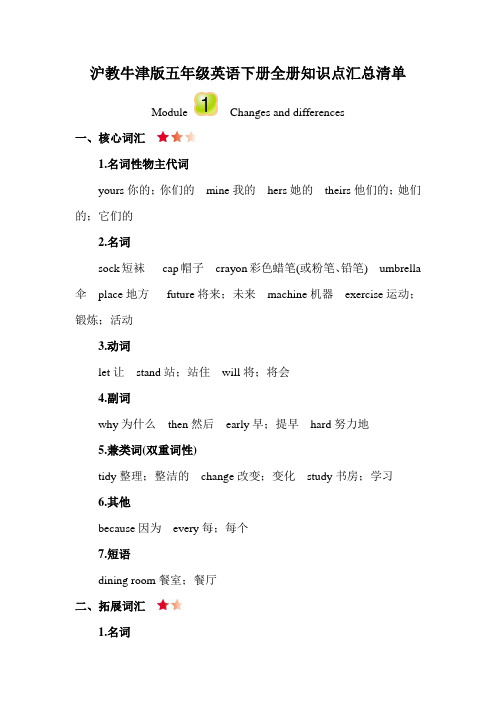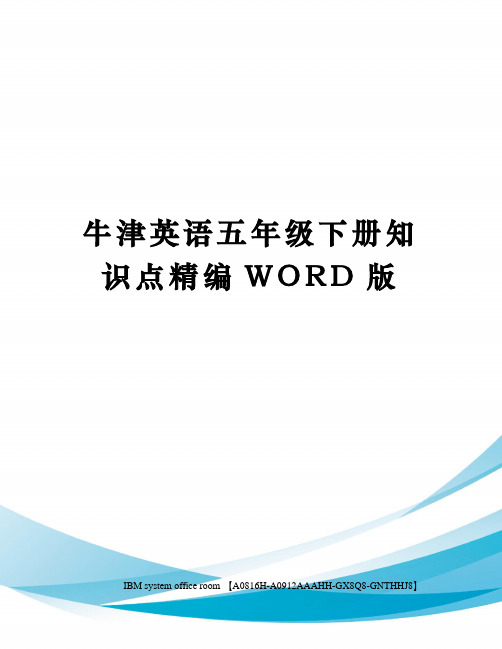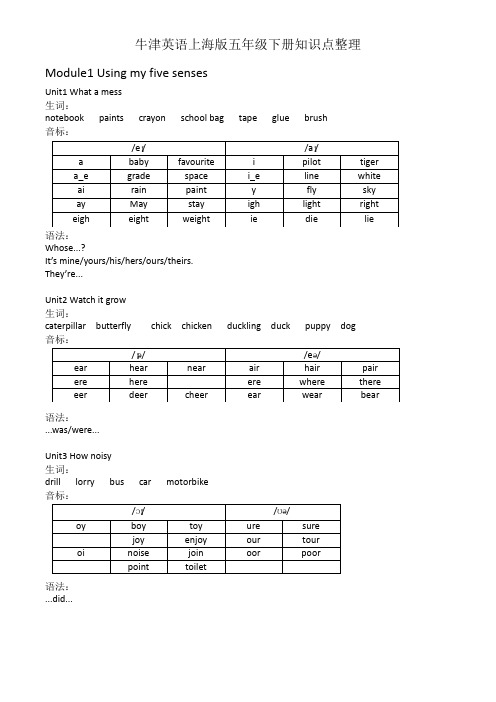(word完整版)上海牛津英语五年级下册语法点整理(2).docx
沪教牛津版五年级英语下册全册知识点汇总清单

沪教牛津版五年级英语下册全册知识点汇总清单Module Changes and differences一、核心词汇1.名词性物主代词yours你的;你们的mine我的hers她的theirs他们的;她们的;它们的2.名词sock短袜cap帽子crayon彩色蜡笔(或粉笔、铅笔)umbrella 伞place地方future将来;未来machine机器exercise运动;锻炼;活动3.动词let让stand站;站住will将;将会4.副词why为什么then然后early早;提早hard努力地5.兼类词(双重词性)tidy整理;整洁的change改变;变化study书房;学习6.其他because因为every每;每个7.短语dining room餐室;餐厅二、拓展词汇1.名词nail钉子second秒(时间单位)mess脏乱;不整洁2.动词drop使落下;掉落stick粘贴;粘住3.形容词enough足够的more更多的4.副词twice两次easily容易地5.兼类词(双重词性)north北方;向北south南方;向南6.短语tidy up把……整理好(be) full of装满……;充满…… a few几个;一些wild goose大雁(复数wild geese) in the future将来in front of在……前面take a photo拍照wear glasses戴眼镜(be)weak in不擅长not …any more不再all day一天到晚do exercise做运动三、核心句型1.—Are they yours?它们是你的?—No,they aren’t. 不,它们不是。
解读: 问句是一个一般疑问句,用来询问某物的归属,有肯定和否定两种回答。
举一反三: —Are these crayons yours?这些蜡笔是你的吗?—No,they aren’t. 不,它们不是。
牛津英语五年级下册知识点精编WORD版

牛津英语五年级下册知识点精编W O R D版 IBM system office room 【A0816H-A0912AAAHH-GX8Q8-GNTHHJ8】M o d u l e1U s i n g m y f i v e s e n s e sUnit1 What a mess生词:notebook paints crayon school bag tape glue brush音标:Whose...?It’smine/yours/his/hers/ours/theirs.They’re...Unit2 Watch it grow生词:caterpillar butterfly chick chicken duckling duck puppy dog音标:语法:...was/were...Unit3 How noisy生词:drill lorry bus car motorbike音标:语法:...did...Module2 My favorite thingsUnit1 Food and drinks生词:Meat: pork beef chicken fishVegetables: tomatoes potatoes carrots cabbages beansFruit: apples oranges bananas grapesStaple Food: rice noodles breadDrinks: juice water milk tea音标:What didyou havefor...?I had...Unit2Film生词:ticketticket office entrance exit seat音标:语法:Shall we...Unit3 school subject生词:Chinese English Maths Art Music IT PE 音标:语法:It’s time for...Module3 Things around usUnit1 Signs生词:telephone toilet restaurant exit entranceNo smoking No swimming Don’t litter Don’t walk on the grass音标:What does this signsay/mean?It says/means we can/can’t/mustn’t/shouldn’t..Unit2 Weather生词:Cloud/cloudy sun/sunny rain/rainy wind/windysnow/snowy storm/stormy fog/foggy 30℃/thirty degrees音标:语法:What ’s the weatherlike? What ’s the temperature?It ’s...(weather).It ’s...(temperature).Unit3 Changes生词:Cupboard bookshelf bed mirror lamp cushion sofa音标:语法:What canwedo?Module4 More things to learnUnit1 Museum生词:Science museum art museum history museum Insect museum car museum railway museum语法:Which museum do you want to visit?I want to visit ...Why?Because...Unit2 Western holiday生词:Christmas Easter Halloween Thanksgiving 语法:When is ...?It’s on ...What do people do on this holiday?Unit3 story time生词:giant castle。
沪教牛津版五年级知识点归纳(K12教育文档)

(完整word版)沪教牛津版五年级知识点归纳(word版可编辑修改) 编辑整理:尊敬的读者朋友们:这里是精品文档编辑中心,本文档内容是由我和我的同事精心编辑整理后发布的,发布之前我们对文中内容进行仔细校对,但是难免会有疏漏的地方,但是任然希望((完整word版)沪教牛津版五年级知识点归纳(word版可编辑修改))的内容能够给您的工作和学习带来便利。
同时也真诚的希望收到您的建议和反馈,这将是我们进步的源泉,前进的动力。
本文可编辑可修改,如果觉得对您有帮助请收藏以便随时查阅,最后祝您生活愉快业绩进步,以下为(完整word版)沪教牛津版五年级知识点归纳(word版可编辑修改)的全部内容。
五上Module 1 -Getting to know each other教学目标:1.学会在具体语境中使用新单词.2学会用 want+动词不定式用法.3.学会介词 on ,by ,at的某些用法。
4.学会疑问代词 what,how,when的用法.5.学会序数词的写法和读法。
重点词汇: ① job taxi driver cook pilot teach teacher become② by walk Ms underground after hour③ party when begin bring thing favourite interesting重点句型:1. —What do you want to be?— I want to be a pilot。
2.-How do you come to school?- I come to school on foot.3.-When’s your birthday?—It’s on 26th September语音发音:sk sp stModule 2 —Relationship教学目标:1。
学会在具体语境中使用新单词。
2掌握一般现在时的常用频度副词。
3.。
学会用所学词汇句型介绍朋友。
(word完整版)牛津英语五年级下册知识点整理,推荐文档

Module1 Using my five sensesUnit1 What a mess生词:notebook paints crayon school bag tape glue brush音标:语法:Whose...?It’s mine/yours/his/hers/ours/theirs.They’re...Unit2 Watch it grow生词:caterpillar butterfly chick chicken duckling duck puppy dog 音标:语法:...was/were...Unit3 How noisy生词:drill lorry bus car motorbike音标:语法:...did...Module2 My favorite thingsUnit1 Food and drinks生词:Meat: pork beef chicken fishVegetables: tomatoes potatoes carrots cabbages beans Fruit: apples oranges bananas grapesStaple Food: rice noodles breadDrinks: juice water milk tea音标:语法:What did you have for...?I had...Unit2 Film生词:ticket ticket office entrance exit seat音标:Shall we...Unit3 school subject生词:Chinese English Maths Art Music IT PE音标:It’s time for...Module3 Things around usUnit1 Signs生词:telephone toilet restaurant exit entranceNo smoking No swimming Don’t litter Don’t walk on the grass 音标:语法:What does this sign say/mean?It says/means we can/can’t/mustn’t/shouldn’t..Unit2 Weather生词:Cloud/cloudy sun/sunny rain/rainy wind/windysnow/snowy storm/stormy fog/foggy 30℃/thirty degrees音标:语法:What’s the weather like? What’s the temperature?It’s...(weather).It’s...(temperature).Unit3 Changes生词:Cupboard bookshelf bed mirror lamp cushion sofa 音标:语法:What can we do?Module4 More things to learnUnit1 Museum生词:Science museum art museum history museum Insect museum car museum railway museum 语法:Which museum do you want to visit?I want to visit ...Why?Because...Unit2 Western holiday生词:Christmas Easter Halloween Thanksgiving 语法:When is ...?It’s on ...What do people do on this holiday?Unit3 story time生词:giant castle。
牛津版五年级下册英语语法知识点

牛津版五年级下册英语语法知识点牛津版五年级下册英语语法知识点汇总语法点归纳:1.Like+动名词如:like swimming2.Like+名词的复数如:like masks3.go+动名词如:goc limbing4.Ho wmany+名词复数如:how manywatches5.different+名词复数如:different countries6.Same前加the,后面一般跟单数,如:the same hobby7.序数词前一定加the,如:the firstday8.在几点用at,如at7o’clock,在某一天或某一天的`具体时间段用on,如:on Sunday,on Sunday morning,直接在早上、下午或晚上用in,如:in themorning9.动词后代词用宾格(动宾)如:join me10.介词后代词用宾格(介宾)如:with him,to her11.wantto+动原,would like to+动原,sorry to+动原,forget to+动原,it’stime to+动原,12.情态动词can后面加动原,let后加动原13.祈使句中动词用原形,否定句在句首加Don’t14.助动词(do does don’t doesn’t)后动词用原形15.形容词加名词(形名)如:a beautiful girl16.动词加副词(动副)如:dance beautifully17.Some用于肯定句,any用于否定句18.Therebe结构就近原则如:There is a teacher and some students in the classroom.19.不可数名词:water coffee tea milk juice bread rice food fruit paper chocola teexer cise fish20.乐器前加the,球类前不加the,(playthe乐器,play球类)如:play the piano,play football21.Who当作特殊的第三人称单数。
上海牛津英语五年级下册语法点

上海牛津英语五年级下册语法点Document serial number【NL89WT-NY98YT-NC8CB-NNUUT-NUT108】上海牛津英语五年级下册语法点整理动词的形式:一、动词后面加上ing:①、现在进行时:表示某个动作正在发生或进行。
它的构成方式是:主语+be+动词ing〔现在分词〕形式,有时会要求自己加上be动词(is,am,are)。
句子中经常会出现look,listen,now……等词。
现在进行时的变化肯定句式:主语+be(am,is,are)+动词ing+其它.否定句式:主语+be(am,is,are)+not+动词ing+其它.一般疑问句:Be(am,is,are)+主语+动词ing+其它?特殊疑问句:疑问词(what,where…)+be(am,is,are)+主语+动词ing+其它?对现在进行时的特殊疑问句的回答,它不可以用Yes或No直接作答,要根据实际情况回答。
练习:1.Whatareyou_________(do)nowI___________(eat)bread.2.It’snineo’clock..Myfather_______________(work)intheoffice.3.Look,theboy____________(put)theplateonhisfinger.4.__________he__________(clean)theclassroomNo,heisn’t.He____________(play).5.WhereisMakHe___________(run)onthegrass.6.Listen,who___________(sing)inthemusicroomOh,Mary___________(sing)there.②like(s),go,dosome,后面的动词加ing.如:1.Ilike(play)football,butmyfatherlikes(play)chess.2.Let’sgo(swim).二、动词后面加s/es.这就有关一种时态:一般现在时。
五年级下册牛津英语M2知识点

Module2知识点汇总Vocabulary词汇一类词汇(要求:会读、知晓词意、会造句表达、会听写)meat pork beef chicken fish vegetable(s)tomato(es) potato(es)carrot(s)cabbage(s)bean(s)fruit rice noodles bread drinks milk juice water tea ticket entrance exit seat shall Chinese English Maths Art Music IT PE subject break timetable二类词汇(要求:会读、知晓词意、会造句表达)breakfast lunch dinner hamburger cola healthy unhealthy either sound a lot of too much chocolate ice cream fridge do exercise hole happen keep...away favourite ham film on上映be quick adult dwarf hunter princess look like fall asleep stay with wake up the fairest Here we are!buy mirror leave add nothing carefully count line dot cinema yesterday run away minute from...to find out safe today have great fun pretty tonight queen一、重点句子(要求:会读、知晓句意、会替换造句、尝试背诵)1.What did you have for breakfast,Danny?I had a hamburger and a cola.2.That doesn’t sound healthy.That’s not healthy either.3.An apple a day keeps the doctor away.语音词汇(要求:会拼读、知晓词意、认读音标)音标组合例词/əƱ/o no ago photo go o_ethose home close hole ow show bowl growcrowblowoa coat boat /a Ʊ/ouout south loud cloud ow how now bow cow /m/m milk mouse room cream film mice moon /n/n night find win incrayonfinerain/ŋ/ng sing ring wingn(k)bankthankn(g)hungry English /j/y yes you yellow year yet /h/h he hat hearhashellohatewh who whose /w/w we wind wait withwhwhenwhatwhere4.Healthy children like running,jumping and playing.They eat a lot of fruit and vegetables.5.Unhealthy children do not play sport very often.They watch too much TV and eat too much sweet food.6.They drink a lot of soft drinks.They do not like rice,fruit or vegetables.7.Jim does some exercise every day.Matt never does any exercise.8.-Shall we go to see a film this afternoon?-Great!/Good idea!/Sorry!9.There are three films on at City Cinema.Which one do you want to see?10.Shall we see Little Tadpoles next time?11.It’s on at two o’clock.Let’s leave home at one thirty.12.Here we are!Let’s buy the tickets first.13.Can I have three tickets for Snow White,please?Two children and one adult.14.Shall we get some drinks?15.Be quick!The film starts in five minutes.16.-What film is on?-Rabbit Run.17.She looks like an old woman.18.What classes do we have today?We have Chinese,Maths,English and IT.19.IT and PE are my favourite subjects.What about you?20.It’s time for Chinese class./It’s time to have Chinese class.21.This is my timetable for today.22.There is a short break after each class.23.From11.30to13.00,I have a lunch break.24.Art is my favourite subject,because I like painting.二、语法知识点(要求:理解并运用)1.too much,too many和a lot of(lots of)它们都是“许多”的意思,但是用法不一样。
上海沪教牛津版英语五年级下册Module 2 重点归纳

—How long will you stay in Sanya? 你将在三亚待多久? —I'll stay there for five days. 我将在那里待五天。 —How long will you stay in the hotel? 你们将在旅馆待多久? —We'll stay there for three days. 我们将在那里待三天。
……………………………………………………………………………………………………………………………………………………………………
推理法是在理解原文表面信息的基础上,作出一定的判断和推理,从而得到文章隐含意 义的阅读方法。
阅读短文,判断正(T)误(F)。 Dear Amy,
I'm happy to write to you. I'll tell you about my summer holiday plan. First, I will join a football club because I like playing football. Second I will visit my grandparents. I miss them very much. I will stay with them for five days. Third, I will learn to cock. My mother is very tired after work. I will cook for her. What about your summer holiday plan, Amy? Please write to me soon.
- 1、下载文档前请自行甄别文档内容的完整性,平台不提供额外的编辑、内容补充、找答案等附加服务。
- 2、"仅部分预览"的文档,不可在线预览部分如存在完整性等问题,可反馈申请退款(可完整预览的文档不适用该条件!)。
- 3、如文档侵犯您的权益,请联系客服反馈,我们会尽快为您处理(人工客服工作时间:9:00-18:30)。
上海牛津英语五年级下册语法点整理
的形式:
一、后面加上ing :
①、在行:表示某个作正在生或行。
它的构成方式是:主 +be+ing〔在分〕形式,有会要求自己加上be ( is, am , are )。
句子中常会出
look, listen, now⋯⋯等。
在行的化
肯定句式:主 +be( am, is, are)+ing+ 其它 .
否定句式:主 +be(am, is, are) + not +ing+ 其它 .
一般疑句: Be(am, is, are) + 主 +ing + 其它?
特殊疑句:疑 (what , where ⋯)+be(am, is, are)+ 主 +ing + 其它?在行的特殊疑句的回答,它不可以用Yes 或 No 直接作答,要根据情况回答。
: 1.What are you _________(do) now? I ___________(eat) bread.
2.It ’ s nine o’. clockMyfather._______________(work) in the office.
3.Look, the boy____________(put) the plate on his finger.
4.__________he__________(clean) the classroom? No, he isn’ t. He____________(play).
5.Where is Mak? He___________(run) on the grass.
6.Listen, who___________(sing) in the music room? Oh, Mary___________(sing) there.
② like(s), go , do some , 后面的加 ing.
如: 1. I like(play ) football, but my father likes(play) chess.
2.Let’s go(swim).
二、后面加s/es. 就有关一种:一般在。
一般在:表示常性的事情。
状: often 常 , usually 通常 , always 是,every 每个 , sometimes 有,
at ⋯在几点
它的化与主人称有关,只有肯定句中第三人称数用三(加s/es),其余均
用原形。
在否定句和句中,因有助do, don ’t , does , doesn’ t,所以后面的用原形。
三化:多数在后加s play— plays like —likes
以s, x, sh, ch, o 尾的加 es go—goes wash—washes watch--watches
以音字母加 y 尾,把 y 改 i 再加 es fly — flies study— studies 一般在
的化:
1、肯定句:主(非三)+原 +其它/主(he , she)+三+其它。
2、否定句:主(非三)+don’ t+原 +其它 / 主( he , she )+ 原 + 其它。
3、一般疑句:Do +主(非三)+原 +其它 / Does +主( he, she ) +原 +其它。
4、特殊疑句:特殊疑(What, Where ⋯) +do +主(非三) +原 +其它
特殊疑( What, Where⋯) + does +主( he , she ) +原 + 其它。
: 1.We often___________(play) in the playgound.
2.He _________(get) up at six o’ clock.
3.__________you _________(brush) your teeth every morning ?
4.What(do) he usually(do) after school?
5.Danny(study) English,Chinese,Maths,Science and Art at school.
6.Mike sometimes __________(go) to the park with his sister.
7.At eight at night, she __________(watch) TV with his parents.
8.________ Mike________(read) English every day?
9.How many lessons_________your classmate________(have) on Monday?
10.What time_________his mother_________(do) the housework?
11.What you usually(do ) on Sundays ?
12.He( not like )( drink ) tea .
13. They(not like )( play ) cards.
三、用原形的名特征有:1、在 can , can’ t, let ’s , shall we后面用原形。
2、助 do , don ’ t , does , doesn’ t 后面用原形。
: 1、 He can( put ) an egg on his mouth .
2. Let ’s( clean ) the library now.
3. Shall we(have ) lunch at eleven o’ clock?
4. Does your uncle(water) flowers every day ?
:用所的适当形式填空:
1. Wang Bing is(write) an e-mail to his friend in the study.
2. I(play) the piano, my brother(watch) TV now.
3.He can(swim), but I(not),I can(ski).
4.Let’ s(go) and(play) basketball .
5.Shall we(clean) the classroom now.
6.I(like)(skate),my parents(not),they(like)(swim).
7.Miss Green(like)(dance) very much.
8.(do) Uncle Wang(run) fast ?
9.GaoShan often(go)(swim) in Summer( 夏天 ).
10.Do you(have)(some)(bobby)? Yes, I(do).
11(do) your father(watch) TV in the evening?No, he(not).
12.This is Helen(speak).
13.Tom usually(play) football after school.
14.He(live) in a small town near Nanjing.
15.Pingping(write) an e-mail to his friend now.
16.What(do) Nancy usually(do)? She usually(grow) flowers .
17. My father _____(like) that song very much. He often _____(sing) it.
18.________he ________(watch) TV in the evening? No, he ________
19.My parents usually________(get) up at 6. My sister _______(get) up at 6:15, and I usually _________(get) up at 6:30
20._______your father _______(fly) kites over there now? Let me see. Yes, he ______. He often ________(fly) kites there. Shall we ______(go) to have a look?
21. My aunt(not like )( cook ).。
